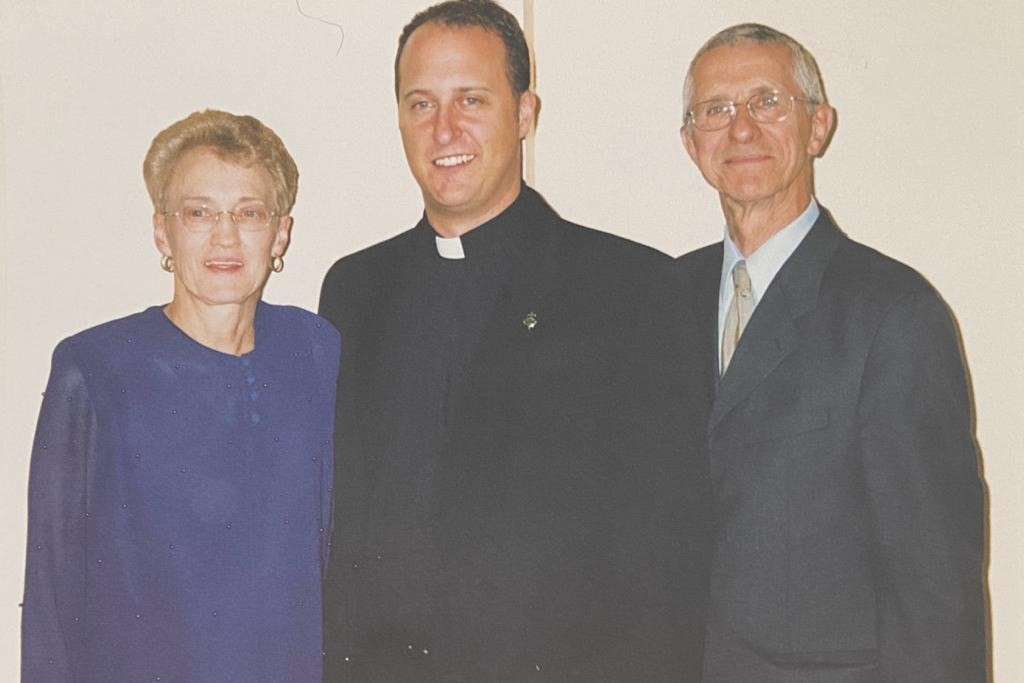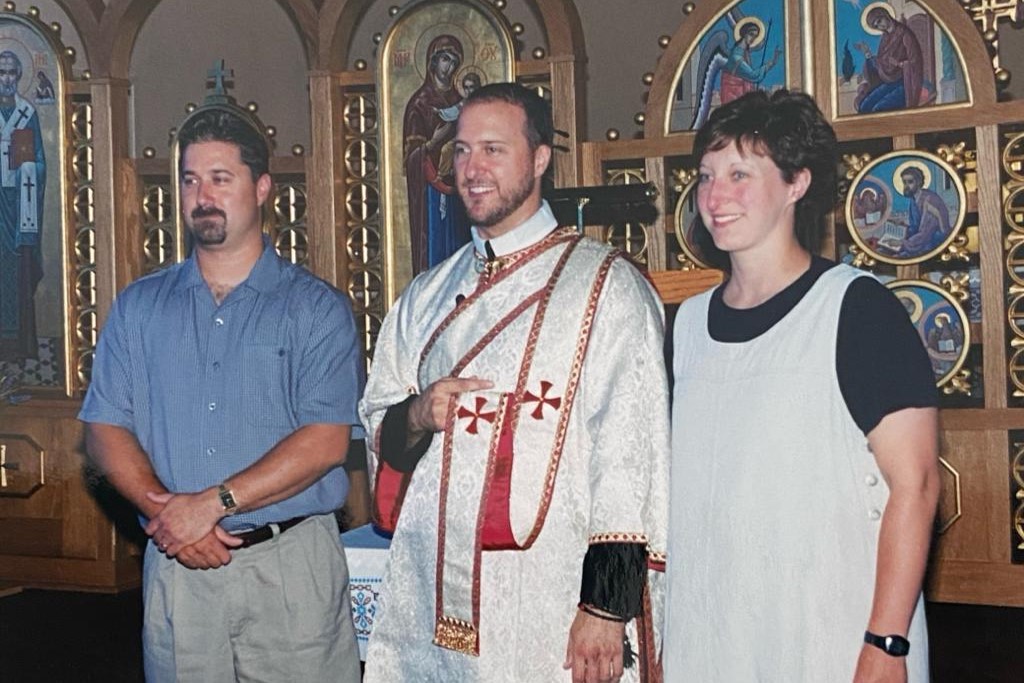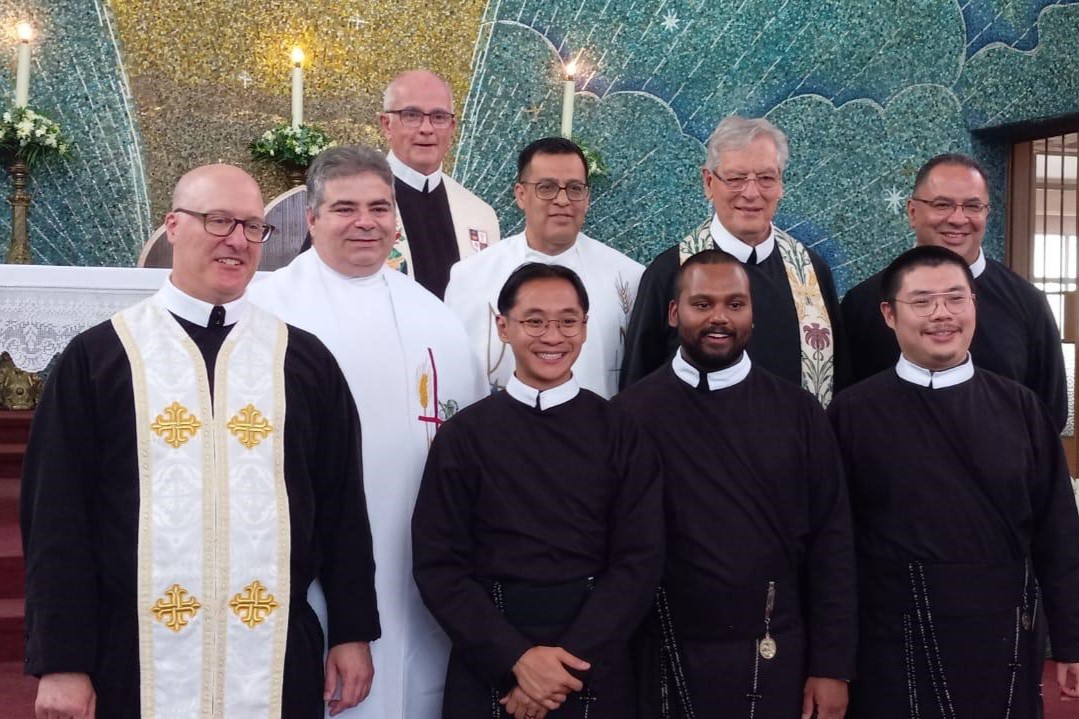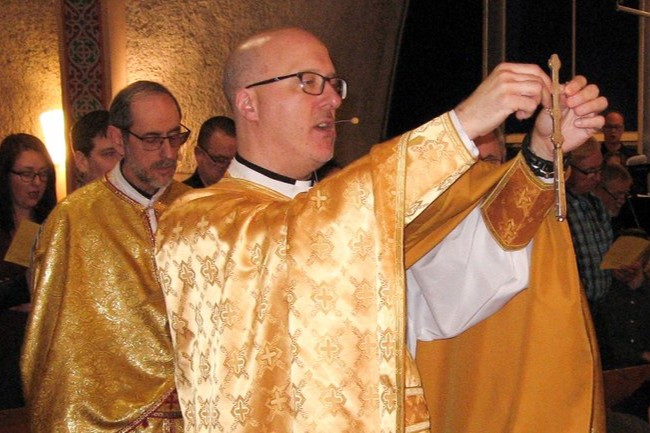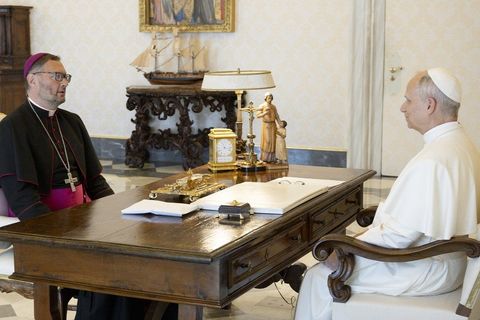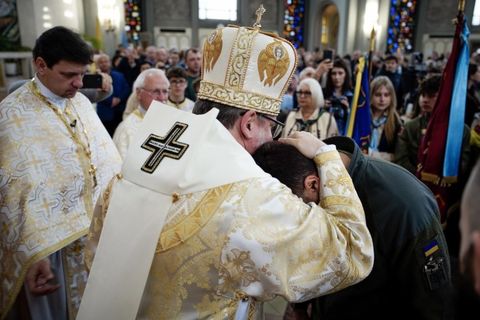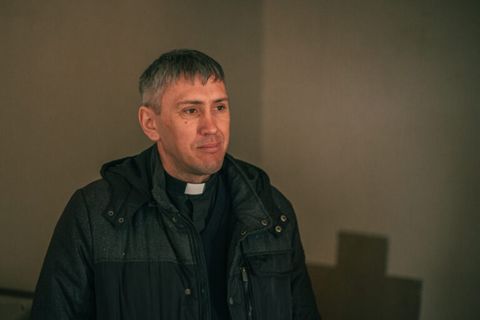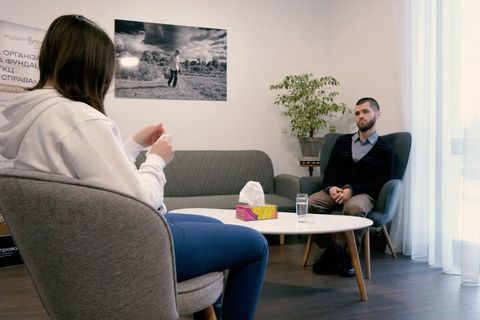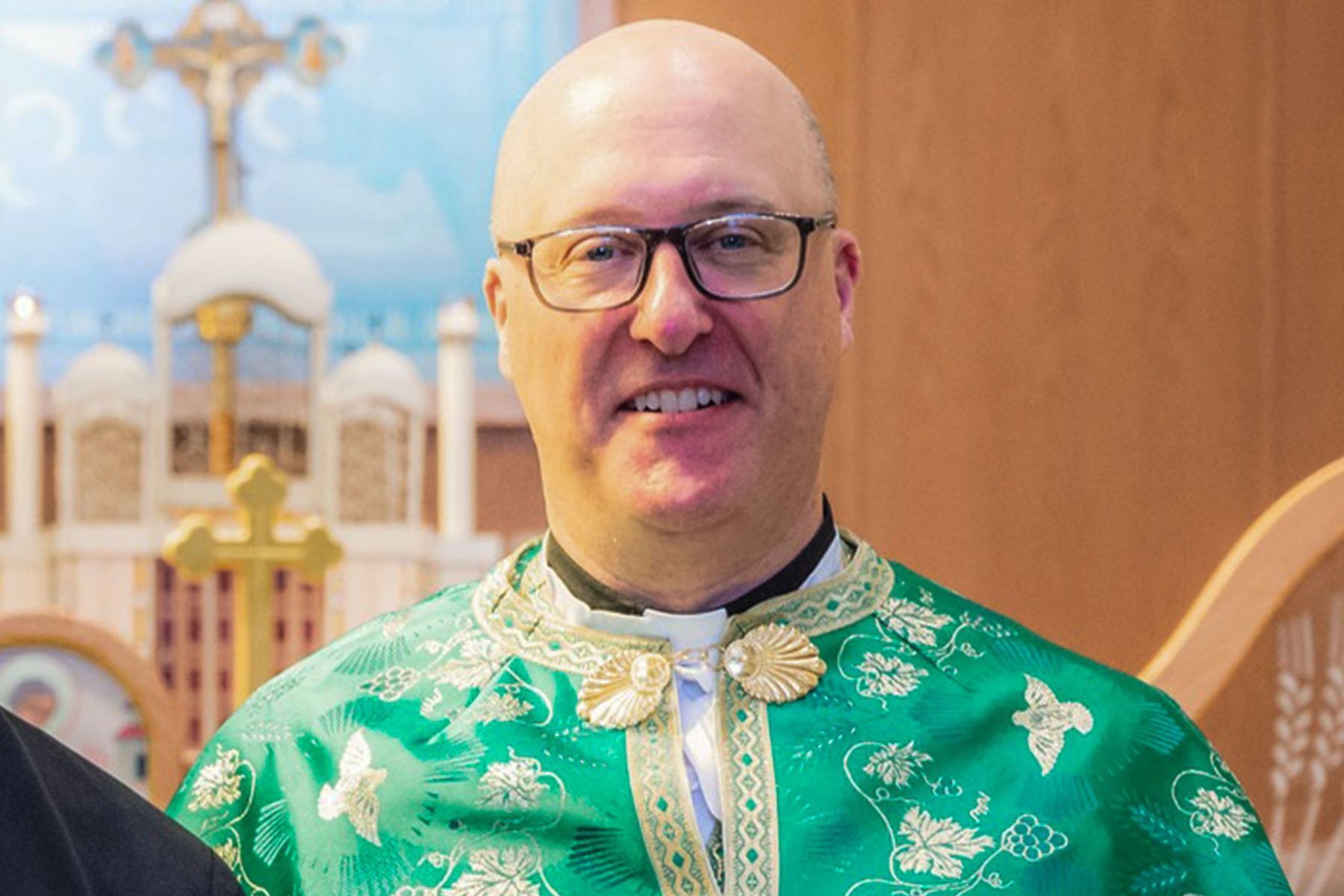
“God showed me that I am at home” — Bishop-Elect Michael Smolinski, CSsR
For 68 years, the Saskatoon Eparchy, which is part of the Metropolia of Winnipeg, has become a space of deep spiritual and cultural life for the faithful of the Ukrainian Greek Catholic Church in Canada. Soon it will receive a new eparchial bishop, Fr. Michael Smolinski, C. Ss. R., whose episcopal consecration and installation will take place on January 19–21, 2024 in Saskatoon.
Born to Morris and Iris Smolinski in Canada, the future Bishop of the Eparchy of Saskatoon, Fr. Michael was spiritually raised and educated in the Ukrainian Redemptorist community at Saints Peter and Paul Parish in Saskatoon. To his family and friends, he is Michael, who loves to play curling, host guests at home, and read a lot. For the faithful, Fr. Michael is a true spiritual father who has always dreamed of serving God and people and never aspired to become a bishop. It is interesting that he hardly speaks Ukrainian, but he claims that he loves Ukraine and its music, the Ukrainian Greek Catholic Church and its traditions too much. The bishop-nominee spoke about his background, vocation to the priesthood and unexpected appointment as a bishop in an interview with the Information Department of the UGCC:
Family background and connection to Ukraine
Fr. Michael: My hometown is Saskatoon, in the province of Saskatchewan in Canada. I was born and raised here. My parents’ names are Morris and Iris, but in Ukrainian their names sound fondly like Myroslav and Orysia. They come from small provincial towns. Once, when they were young, they came to Saskatoon, met here, got married, and started a family. By the way, they met in a youth group at the Ukrainian Catholic Parish of Saints Peter and Paul, which belongs to the Redemptorists. This is the place where I was baptized, grew up, and began serving the Church. It is a community that has had a huge impact on my life.
Although most of my grandparents were born in Canada, it is very important for our family to remain Ukrainian in our hearts. This connection is really very strong. I have been to Ukraine several times and felt that our church is a church for Ukrainians. Of course, it also welcomes everyone in different parts of the world, including Canada. People marry Ukrainians, come and join our Church and fall in love with it. It is incredible!
Now in Saskatoon, I live in a Ukrainian Catholic residential complex, and my mother is not far away. It’s a great blessing to live next to her. She’s 83 years old, but she’s still full of energy. My father died in 2019, just before the COVID-19 pandemic. I must admit that we as a family are still feeling this great loss, even though 4 years have passed since his death. Dad died very suddenly, before his 80th birthday.
I am happy to have an older brother and sister. My brother is the oldest. He lives with his family in Moose Jaw, Saskatchewan. My sister lives in Saskatoon.
“I love our church too much… I wouldn’t want to be anywhere else”
I have been a priest for 20 years now, and this is a great gift from God. I confess that I don’t really know when I felt the call to the priesthood, but I do remember that I felt the call to life in the community of the Congregation of the Most Holy Redeemer (C. Ss. R.).
While studying at university, I was very fascinated by the fact that Redemptorists here in North America were involved in various charitable projects. I learned about who the Redemptorists are, about their charism, about their mission in the Church — to preach the Gospel to the poor and the most abandoned. It really attracted me, and I felt that I wanted to be a part of it.
So I think my vocation was more to be a Redemptorist than a priest. I could have been happy as a brother or deacon, but I became a priest. I have known this community all my life, but it was only at university, when I became more mature, that I began to really study what kind of community it was and its activities.
Now I realize that I love our church too much, I love our traditions, our music, and our way of worshipping God. I would not want to be anywhere else. For the last year, as a provincial superior of the Redemptorist Congregation in Canada, I had a lot of contact with Latin rite Catholicism, and my prayer life was a combination of Latin and Ukrainian traditions. I missed our Church very much, the celebration of all the feasts and fasts in our way. It was a great blessing for me to return home to Saskatoon and serve in our Ukrainian Greek Catholic Church on a full-time basis.
From teaching to theology: on education and formation
Initially, I majored in Education because I planned to become a teacher. I studied at the University of Saskatchewan for 4 years. After graduation, I was looking for a job as a teacher. At the time, it turned out to be a very difficult task, so I went to work as a youth pastor in the Edmonton Eparchy, which borders the Eparchy of Saskatoon and I spent 2 years there.
I liked getting my education as a teacher, but for some reason I didn’t feel that it was 100 % mine. I felt that there was something else.
When I worked as a youth minister, I lived far away from the Redemptorists. There were Roman Catholic Redemptorist communities in Edmonton, but no Ukrainian ones. I missed the community I grew up in, their mission, their ministry, their parishes. And after 2 years, I reconnected with the Redemptorists by going to them for a few months as a volunteer.
A few months later I began my formation at the seminary in Toronto. I studied at the Faculty of Theology at St. Michael’s University. I loved everything about my studies: both what I was studying and learning much more about the Church. We had great professors and a wonderful community of like-minded people.
After graduating with a master’s degree in theology in Toronto, I spent another year studying Eastern Christian theology in Ottawa, the capital of Canada, where the Metropolitan Andrei Sheptytsky Institute was located at the time. Most of the courses at seminary were offered from a Western perspective. But the professors always encouraged me, as a Ukrainian Catholic seminarian, to write my papers and individual studies from the perspective of our Ukrainian Catholic tradition. So, I believe that thanks to my studies in both Toronto and Ottawa, my formation and education became fully developed.
A life-changing surprise
It happened on November 23, 2023. That day, as a provincial superior of the Congregation of the Most Holy Redeemer in Canada, I had many meetings — I was working on a document for our new province in Canada for Redemptorists. At the end of the meeting, I looked at my cell phone and thought: “Why am I getting video calls from Ukraine?” And I realized that something was going on.
When the meeting was over, I took a deep breath and maybe even drank a glass of water. Eventually, we got in touch — it was Father Oleh Oleksa, the secretary of His Beatitude Sviatoslav. Then the head of the church himself called me. I had a conversation with him. He told me about his own experience, about how he was appointed bishop for Argentina and how difficult this decision was for him. In fact, I really appreciate the time he spent with me on the phone — His Beatitude supported me morally, and I felt encouraged by him. So I answered yes to his request for appointment. Frankly speaking, I never wanted to be a bishop. I always thought that if someone called me, I would say: “No, never.”
My appointment was and still is a surprise to me. Although over the past few years there have been small hints that this honourable appointment might happen in our Ukrainian Catholic Redemptorist community in Canada.
Most priests named Michael have become bishops. So people always jokingly said to me: “Well, Michael, you’re going to be a bishop, too,” and I would answer: “No, I’m a simple parish priest, and this is what I know best.”
However, the Synod of Bishops of the UGCC, Patriarch Sviatoslav and the Holy Father think differently. Despite the fact that I was surprised, shocked, and scared, I very quickly said yes.
What makes a good bishop?
A good bishop must be a leader, a father, and a servant — all in one person. Therefore, it is not an easy ministry. People have different needs. In my opinion, a bishop can be compared to a juggler who throws many balls in the air at the same time. A bishop also has to do many different things and achieve a delicate balance in his ministry.
I am learning. I still have a lot to learn about what my task is. A year ago I worked in the Eparchy of Saskatoon as a priest, so I know a lot of the difficult things that happen here. I am not afraid of the hard work that awaits me.
I know that I am a bishop, but I like to talk to people, to serve them, to listen to their thoughts. I want to come to common decisions in the spirit of synodality in the Church, to listen and open up with great attention, as the Synod encourages us to do.
At the moment I have no vision of what will happen next. I need to study, listen and pray more. Now I feel a little more comfortable. It’s time to go through the episcopal ordination and then start working with great gratitude to the Lord.
How the Church in Canada serves and supports Ukrainians
Since the beginning of the full-scale war in Ukraine, the Church in Canada has been very active in working with refugees. A significant number of Ukrainians have arrived in different parts of the country, including our diocese. Some have found temporary shelter here, while others have nowhere to go and will stay here forever.
So the Church extends a hand of help and hospitality, but sometimes it has to change and adapt. In some places in western Canada, the Church is now predominantly serving in English. We all need to preach in the language spoken by the newcomers. We have to work on this.
During this time, the Church has opened new parishes across the country to meet the needs of Ukrainians, such as in St. John’s Newfoundland on the east coast of Canada. Now there are monthly services for Ukrainians, both Catholic and Orthodox. Before the war, there were very few Ukrainians there, but the situation is changing and we are trying to respond to the needs promptly.
In our Redemptorist community, we also lent a helping hand, including raising funds to send to Redemptorists in Ukraine — monasteries that have become humanitarian centers where people in need receive help.
We have three Ukrainian Catholic parishes in Saskatoon, two of which have large numbers of newly arrived Ukrainians. We have the Bishop Filevich Ukrainian Bilingual School. Last year, it more than doubled in size as new children from Ukraine arrived. The school is part of our Ukrainian Catholic community and certainly also does a lot for the refugees who have come here.
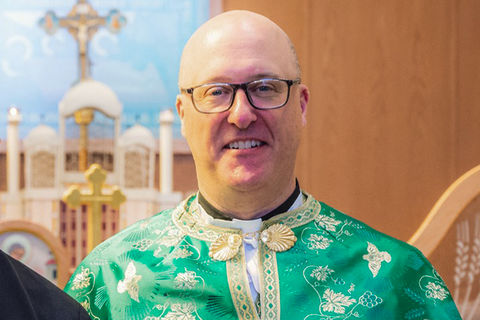 Read also:
Read also:
The episcopal ordination of Father Michael Smolinski will take place in January in Saskatoon
Why did God call you to serve as a bishop?
It is difficult to answer. However, I think He is showing me that I am at home, in the right place, and I know what to do and how to serve the faithful here in the Ukrainian Catholic community. Perhaps God chose me to be here, at home, to meet the immediate needs of the faithful and to work for the future.
By Vira Valchuk, Information Department of the UGCCUnofficial English translation published on the website of the Saskatoon Eparchy, for informational purposes only
